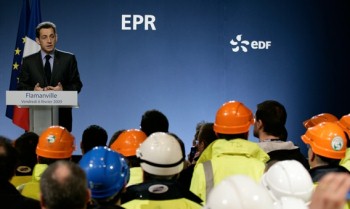France considers its position
28 July 2010
France is revising its nuclear strategy to improve reactor technology and boost cooperation between national champions Areva and Electricité de France (EdF). Up to 15% of Areva will be sold as optimisation takes place on the EPR design.
Announcements came yesterday after President Nicolas Sarkozy met with the Nuclear Policy Council as it reviewed a report by former EdF chief Francois Roussely.
Roussely wrote that the country's nuclear sector, on which its electricity and therefore industry relies, is facing a "double challenge" in the years to 2030. It needs to continue to operate at top levels of safety, while extending the operation of existing reactors and building more. Meanwhile, decommissioning will accelerate and waste management programs will make major steps.
And internationally, France is hoping to win a large share of the 250 new reactors Roussely thinks will be ordered before 2030. The current market for these is "highly segmented and highly competitive," he noted, and 'Team France' has to "make considerable efforts to improve its offer against other industry giants."
The response from the council was "to strengthen the unity of the French nuclear industry around its national champions," first with "a strategic partnership agreement between EdF and Areva covering all their areas of common interest."
 |
| President Nicolas Sarkozy during an earlier trip to Flamanville |
Working on two levels, this upgraded partnership should help ensure EdF's supplies of uranium fuel as well as allow the two to collaborate for Areva's reactor exports by setting up "an organisation based on the expertise of EdF as operator and architect-engineer." Such a deal would not stop the firms making other alliances should they want to. In his recommendations, Roussely said EdF should be confirmed in its role as architect and integrator of 'Team France'.
Power engineer Alstom, and construction companies Bouyges and Vinci were also counted among the country's industrial powers.
Support for exports should also come from improvements to Areva's manufacturing capability, thanks to the sale of up to 15% of shares to raise investment capital. The company is about 93% state-owned via shareholders such as the CEA (79%), as well as state banks, holding companies and EdF (itself 85% state controlled). The announcements did not say which of these would be directed to divest part of their share, but did mention that EdF's holding could be increased in line with the new partnership.
Tough love
Speaking frankly about the French nuclear sector, Roussely's report warned that "The credibility of both the EPR model and the ability of the French nuclear industry for success in new construction have been seriously undermined by the difficulties encountered on the Olkiluoto site in Finland and at Flamanville."
The complexity of the EPR model "including the level of power, the core catcher and the redundancy of safety systems is certainly a handicap for its implementation and therefore its cost. These factors explain in part the difficulties encountered in Finland and at Flamanville." The design is to be optimised to simplifiy its construction.
He recommended that EdF establish a program to ensure the best construction performance from now on at Flamanville and use feedback from that project as well as Olkiluoto 3 and Taishan 1 before starting work on the next French EPR at Penly. He said this feedback would benefit EdF's plans for the UK and lessons learned from the process should be absorbed in a timescale compatible with UK schedules.
France's nuclear product line needs to be expanded, Roussely said, with smaller models such as the 1000-1150 MWe Atmea 1 design under development by Areva and Mitsubishi Heavy Industries, which offers an alternative to the 1650 MWe EPR.
Researched and written
by World Nuclear News